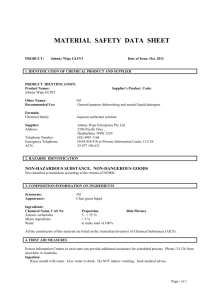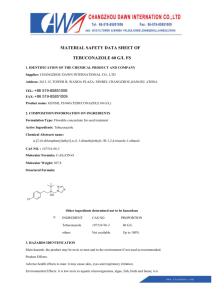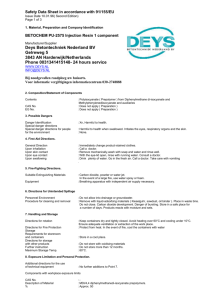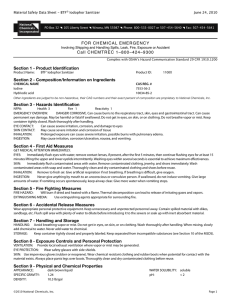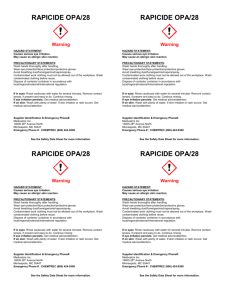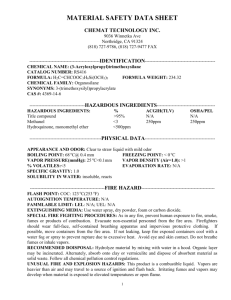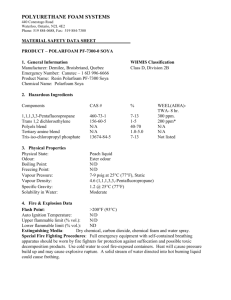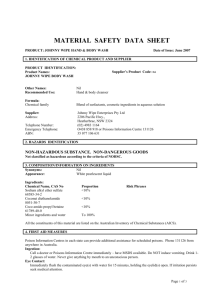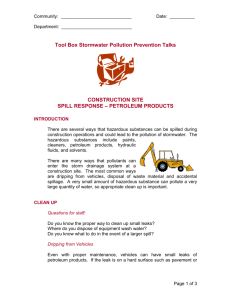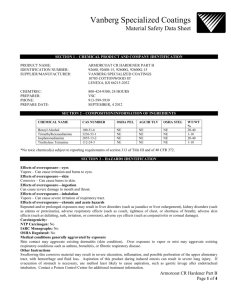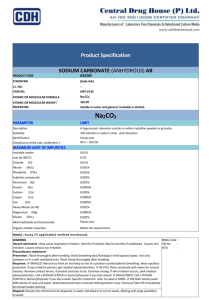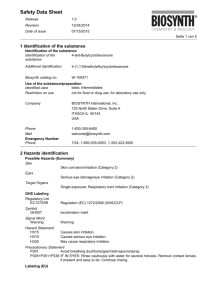לכבוד,
advertisement
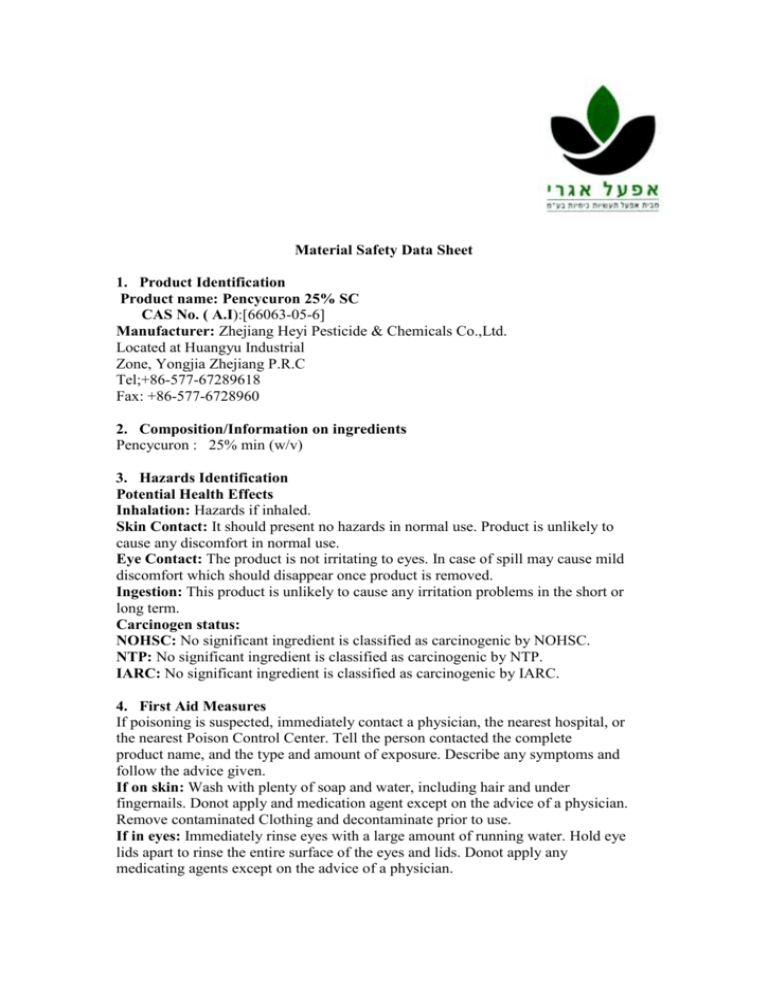
Material Safety Data Sheet 1. Product Identification Product name: Pencycuron 25% SC CAS No. ( A.I):[66063-05-6] Manufacturer: Zhejiang Heyi Pesticide & Chemicals Co.,Ltd. Located at Huangyu Industrial Zone, Yongjia Zhejiang P.R.C Tel;+86-577-67289618 Fax: +86-577-6728960 2. Composition/Information on ingredients Pencycuron : 25% min (w/v) 3. Hazards Identification Potential Health Effects Inhalation: Hazards if inhaled. Skin Contact: It should present no hazards in normal use. Product is unlikely to cause any discomfort in normal use. Eye Contact: The product is not irritating to eyes. In case of spill may cause mild discomfort which should disappear once product is removed. Ingestion: This product is unlikely to cause any irritation problems in the short or long term. Carcinogen status: NOHSC: No significant ingredient is classified as carcinogenic by NOHSC. NTP: No significant ingredient is classified as carcinogenic by NTP. IARC: No significant ingredient is classified as carcinogenic by IARC. 4. First Aid Measures If poisoning is suspected, immediately contact a physician, the nearest hospital, or the nearest Poison Control Center. Tell the person contacted the complete product name, and the type and amount of exposure. Describe any symptoms and follow the advice given. If on skin: Wash with plenty of soap and water, including hair and under fingernails. Donot apply and medication agent except on the advice of a physician. Remove contaminated Clothing and decontaminate prior to use. If in eyes: Immediately rinse eyes with a large amount of running water. Hold eye lids apart to rinse the entire surface of the eyes and lids. Donot apply any medicating agents except on the advice of a physician. If inhaled: Move victim from contaminated area to fresh air. Apply artificial respiration if necessary. If ingested: If victim is fully conscious, give a large quantity of water to drink and induce vomiting. Never give anything by mouth to an unconscious person. 5. Fire Fighting Measures Extinguishing Media: Water; Carbon Dioxide; Dry Chemical; Foam Special Fire Fighting Procedures: Cool exposed containers with water spray. Fight fire from upwind position. Use self-contained breathing equipment. Contain run-off by diking to prevent entry into sewers or waterways .Equipment or materials involved in pesticide fires may become contaminated. 6. Accidental Release Measures Accidental Release Measures: Isolate area and keep unauthorized people away. Do not walk through spilled material. Avoid breathing dusts and skin contact. Avoid generating dust (a fine water spray mist, plastic film cover, or floor sweeping compound may be used if necessary). Safe guards (Personnel): Use recommended protective equipment while carefully sweeping up spilled material. Place in covered container for reuse or disposal. NOTE: Review Fire Fighting Measures And Handling (Personnel) section before proceeding with clean-up. Use appropriate Personal Protective Equipment during clean-up. Initial Containment: Dike spill. Prevent material from entering sewers, waterways, or low areas. Spill Clean Up: Shovel or sweep up. 7. Handling and Storage Handling (Personnel): Avoid breathing vapors or mist. Avoid breathing dust. Avoid contact with eyes, skin,or clothing. Wash thoroughly after handling. Wash clothing after use. Do not store or consume food, drink or tobacco in areas where they may become contaminated with this material. Users Should:Wash hands before eating, drinking,chewing gum,using tobacco or using the toilet. Handling (Physical Aspects): Avoid dust generation Storage: Keep out of the reach of children, store in a well ventilated place. Keep container tightly closed. Do not store or consume food, drink or tobacco in areas where they may become contaminated with this material. Store product in original container only.Do not contaminate water ,other pesticides, fertilizers,food or feed in storage, store in a cool dry place. 8. Exposure Controls/ Personal protection Respiratory protection: No personal respiratory protective equipment normally required. Hands protection: Solvent-resistant gloves. Eye protection: Safety glasses with side-shields Skin and body protection: Light protective clothing, PVC, PVC boots 9. Physical and Chemical Properties Physical state: Liquid Odour: Mild characteristic Colour: Brownish PH value: 6.0-9.0 Relative density: 1.22 (20°C) 10. Stability and Reactivity Conditions to avoid: Extremes of temp. and direct sunlight Materials to avoid : None Hazardous reactions: No hazardous reactions when stored and handled according to prescribed instructions. Stable under recommended storage conditions. 11. Toxicological Information: (according to GLP tests on Efal's formulation) Acute oral: LD50> 2000 mg/kg Acute dermal: LD50 2000 mg/Kg Acute dermal irritation: Non irritant Eye irritation: Non- irritant (rabbits). Skin sensitization: Non- sensitizer (rabbits). Inhalation: LC50 > 2.66mg/L EPA (formulation): IV NOEL (2y): for male rats 50, female rats 500, dogs 100, male and female mice 500mg/kg diet. ADI: 0.02mg/kg b.w. 12. Ecological information Ecological Fate: LC50 (96h)for rainbow trout >1000mg/l (11°C) Toxicity to Fish : Toxicity to Daphnia magna: EC50 (48h) 1mg/l seudokirchneriella subcapitata >562 mg/l.PToxicity to Algae: EC50 (72h) for 13. Disposal considerations General disposal guidance; Do not reuse product containers. Dispose of product containers, waste containers and residues according to local, state and federal health and environmental regulations 14. Transport Information ADNR Not dangerous goods ADR Not dangerous goods IATA_C Not dangerous goods IATA_P Not dangerous goods 15. Regulatory Information S-phrase(s) S24 Avoid contact with the skin. S37 Wear suitable gloves. 16. Other information The above information is believed to be correct on the date it was last revised and must not be considered all inclusive. The information has been obtained only by a search of available literature and is only a guide for handling the chemicals.Persons not specifically and properly trained should not handle this chemical or its container.
